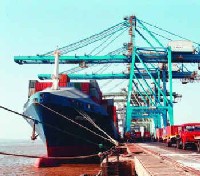 | « Back to article | Print this article |
In his Budget speech, the finance minister said he proposed to introduce self-assessment in Customs to quicken the clearance of cargo by Customs authorities and further modernise the Customs administration. Under this, he said importers and exporters would themselves assess their duty liabilities while filing their declarations in the Electronic Data Interchange (EDI) system.
Under this, he said importers and exporters would themselves assess their duty liabilities while filing their declarations in the Electronic Data Interchange (EDI) system.
The announcement left many importers and exporters wondering what he intended, when the practice in most EDI Customs stations is to carry out assessments on selected bills of entry based on risk parameters and to allow the other consignments to be cleared on the basis of the declarations of the importer or exporter.
The Finance Bill later revealed the proposal was to make far-reaching amendments to the Customs Act of 1962 that can significantly impact the way Customs handle the assessments.
First, the definition of assessment in Section 2 of the Customs Act is being amended to include self-assessment.
Second, Section 17 of the Act is being amended to provide legal backing for self-assessment.
Third, consequential amendments are proposed to Section 18 which deals with provisional assessment, Section 19 which deals with articles liable to different rates of duty, Section 46 which deals with filing bills of entry and Section 50 which deals with filing shipping Bill.
The proposed amendment to Section 17 aims to provide that the importer or exporter shall self-assess the duty, if any, leviable on the goods.
The proper officer shall have powers to verify the self-assessment, examine or test any goods and for verification, require the importer or exporter to produce any document or information for ascertainment of duty and the importer or exporter shall be required to produce such document or information.
If it is found after such verification that self-assessment is not done correctly, the proper officer may reassess the duty leviable on such goods, which the importer or exporter may confirm.
Where the importer or exporter does not confirm the reassessed duty amount, the proper officer shall pass a speaking order that can be appealed against.
In cases where reassessment has not been done or speaking order has not been passed, (that is, in cases where the duty is paid on the basis of self-assessment), the proper officer may audit the duty assessment either at his office or at the premises of the importer or exporter.
This is to ensure that cases of self-assessment are routinely audited after clearance of the goods.
For this purpose, suitable disciplines have to be detailed and so, enabling amendment is being proposed to Section 157 to empower the Central Board of Excise and Customs to issue regulations for specifying the manner of conducting the audit.
After the proposed amendments, electronic filing of bills of entry and shipping bill will be the norm and manual bills of entry or shipping bills will be by way of exceptions.
As there are some Customs stations that are still not EDI enabled and there may be exceptional situations, the Commissioners of Customs have been empowered to file manual bills of entry or shipping bills.
The proposed amendment move towards a trust-based compliance management that will release the resources of the Customs to focus on consignments that involve higher degree of risk.